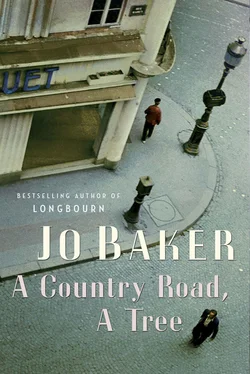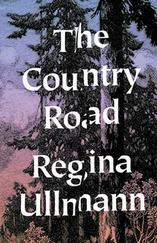“You eat like a bird. Are you ill? You’re not ill.”
Eating like a heron or a puffin or a gannet: all that stabbing, scooping, struggling and gulping; eating like an eagle or a hawk that smashes its prey into the ground and tears it into messes. Owls swallow their dinners whole and cough up boluses of bones and fur. He picks apart his toast and eats a fragment: Is he eating like a penguin, perhaps?
Something lands hard overhead: a hairbrush or a shoe hitting the floor above. He flinches but doesn’t look up, while she, distracted for a moment, peers at the cracks in the ceiling, and her face softens. There are voices, a clattering of footsteps. A door slams.
“They’ll bring the whole place down around our ears.”
It is precarious, this little rented house by the harbour, with its rattling windows and fireplaces that smoke. So she stuffs the rooms with guests, to keep the walls from buckling in, to stop the roof from collapsing down on top of her. Sheila and Mollie, his cousins; Sheila’s girls, Jill and Diana: all the daughters that his mother didn’t have. And she won’t hear of them leaving, however old the season grows. The cold winds do not blow. The summer will not end. There are no clouds.
“Those girls.” She smiles and shakes her head.
He swallows down another bit of toast; she pours herself a cup of milky coffee. A slick drip gathers on the lip of the pot and they both watch it fall. He is just about to push away his chair when she looks up and says, “Oh, I saw a friend of yours the other day in town. Lovely boy. Medical man. Can’t for the life of me remember his name now. He would have been a couple of years below you at Portora.”
He knows who she means. “That would be Alan Thompson, I’d imagine.”
“Ah yes. Doctor Thompson, that was it. He’s doing very well.”
“So I believe.”
And had been a pale frog in the peat waters of the Erne; in whispering huddles in the library, cricket whites, a naughty caught-red-handed smile. Later, in the middle of the medic crowd at Trinity, crossing the quad in a gaggle with wine bottles and a whiff of cigars. Always seemed to be at the centre of things, to simply know how to be. Encountered since and drunk with; helpful, when help had been needed. A good man.
He lifts the skin off his coffee, a greasy caul, and drapes it into his saucer. He shouldn’t do it to her, but: “Unless it was his brother Geoffrey,” he says.
She folds her lips. Geoffrey is a psychiatrist. “I’m not sure that I would consider that medicine.”
But it is a palliative. I do sleep sometimes now, he thinks of saying. I can breathe: air comes in and out of me as required. You might consider that a good. You might think it money well spent. Is that not medicine, after all?
“Well,” he says. “Good for their old mam; she must be very proud.”
He lifts the little silver lid on the marmalade and picks the spoon out of the jar.
“Were you getting anything…written, in Paris?” she asks.
He watches the marmalade drip. It is thin and slides off the spoon like spittle. He feels her discomfort and her desire. Could he not, for once, write something respectable, something that she could leave out for her visitors to admire? He sets the spoon back in the pot, fits the little silver lid back into place around it.
“No,” he says. “Nothing much.”
“Well then, you may as well stay here.”
He looks up at her strong-boned face, its feathering lines. “Is that right?”
“You’ll get so much more done here, with us to look after you. You can write those articles for the paper. I know Paris is cheap, but that’s no real help at all if it just encourages you to be spendthrift; if your allowance—”
He goes still. She has become accomplished at this. The incision is precise, as is the pause.
“—if you can’t live reasonably well on your allowance there, and there are too many distractions from your writing, then there is nothing for it but to stay here. For your own good.”
And be begrudged. As if he were not keenly enough aware that the food he eats, and the air he breathes, and the water — and the whiskey — that he drinks, that the space he takes up in the world is most dreadfully squandered.
“If nothing else, you could help your brother in the business.”
“He wouldn’t thank me for it.”
“He could do with the assistance.”
“The last time I got involved, I made a right hames of things. Frank can do without that kind of trouble.”
This makes her wince, as if it tastes sour.
“I know that if you would just make the effort, if you would exert yourself, if you would…” She trails off. “You did so well at the College. Everybody said.”
Having arrived at that, she must be almost done.
“I’m sorry, Mother.” His long, lean frame unfolds, the chair shunting backward.
“Where are you going?” she asks.
“Fresh air.”
“Sure, you haven’t finished your breakfast.”
“I’ve had enough, thank you.”
He is followed from the room by the sound of her long, deflating breath; his shoulders rise at it.
But quietly, alone, surrounded by the meal’s debris, with the sound of young voices from the upstairs rooms, she presses at her eyes. It is just all so sketchy, so insubstantial, the way that he is living; it’s all hand-to-mouth and day-to-day. That crowd in Paris: she doesn’t know the half of it, she suspects, and, really, she doesn’t want to know. But the sight of him in that hospital bed, his chest in bandages, the nurses jabbering away in French: she blinks, her eyes wet. When she thinks what he could have been. Her brilliant, beautiful boy. Throwing it away, just throwing it away. Until he has the heart turned sideways in her.
Because it doesn’t even make him happy, does it? If he could just be happy.
The girls thunder down the stairs into the hallway to greet their almost-uncle; his voice is warm and cheery in reply. A glimpse of him at a distance. Of why he must always be leaving.
—
All shiny buckled shoes and neat cardigans, Jill and Diana are to take themselves out for the morning. He feels seedy and liverish and guilty; the two of them are so glossy and clear-skinned and lovely, and full of skittish energy, like ponies.
“Oh, hang on two ticks,” he says.
He fishes out coins, drops a clutch into cupped palms. “Get yourselves some toffees.”
“Gosh, thanks!”
He follows as they clip down the front steps into the street. They are chattering, gleeful, sounding so English; they will stride along the seaside pavements, heads together, past the folded papers in racks, the honesty boxes and the crates of apples and plums and tomatoes; in the sweetshop the shelves are cheerful with jars of pastel bonbons, chalky mints, glossy toffees, boiled sweets like stained-glass windows. They’ll slaver and suck and crunch on the quayside, watch the boats lean in the wind, the waves jostle, hear the rigging slap. He feels solicitous for these moments, their accretion. That they be strung together like beads on a thread, to be counted through in later times.
He leaves them to it, turns the other way along the beach, the stones shifting and sliding underfoot, his narrow Italian boots useless for this, for anything more challenging than urban flags and cobbles. He follows a belt of rotting seaweed for the slippery comfort of it, stalking along like a wading bird, ungainly and in a hurry. Striding up through sea kale now and bleached-out thrift, all its little heads tossing in the wind. He follows a worn-bare line in the salt-grass that takes him up towards the road and the last houses of the town. The sun is low. The shadows are long. The wind comes bundling down from the mountains.
Читать дальше










